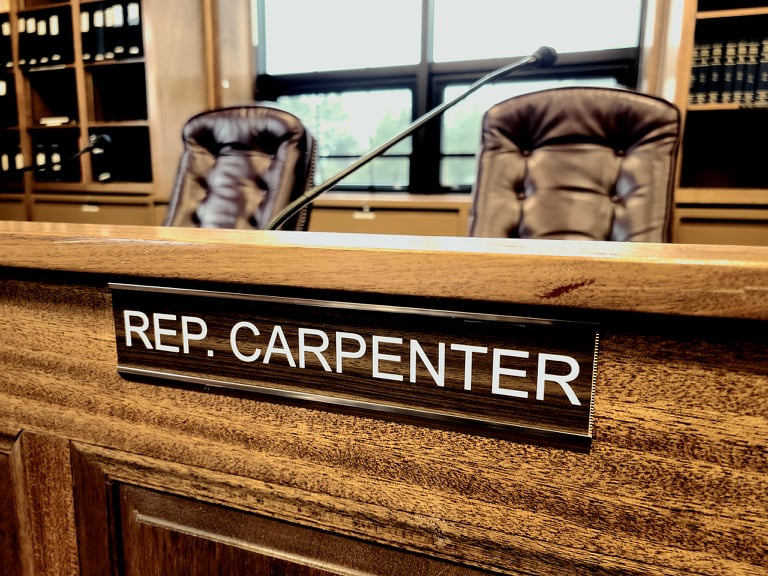This newsletter marks week five of the second session of the 32nd Legislature. Prior to the start of this session, I predicted that there would be a push to make early (Pre-K) education part of our education system. SB 111 has bi-partisan support to do just that. The house is considering its own education bill, one of many, HB 164, that would make changes to the education system. It stinks. It has less support than SB 111, and although the House Education Committee has held 14 meetings on the bill, it seems unlikely to go very far.
SB 111 also ushers in the Read-by-9 program that has been promoted by some as the solution to our state’s abysmal fourth-grade reading results. In essence, the bill authorizes the Department of Education and Early Development (DEED) to implement a program of reading standards, targeted intervention, and accountability measures at the school level to correct what many of our districts & school boards have been unable to correct.
While responsibility for quality education currently resides at the local level, SB 111 will withhold the responsibility for reading outcomes to DEED. There is risk that this action will set a precedent that will lead to future state control of other education outcomes.
Honestly, I can’t blame those who point to our reading instruction failures and say that districts need to be held accountable by the state. Continuing to fail our children isn’t an option. It’s just too bad that some school boards haven’t also reached this conclusion. New accountability and intervention measures that correct our poor reading performance are currently entirely in the hands of our school boards. Because of their failure, the state may be left with no choice but to act.
The bi-partisan support for SB 111 is achieved through an acknowledgment of the political reality: the education establishment, excluding DEED, will not support the creation of the Read-by-9 program without also creating the Pre-K program.
Pre-k is expected to increase annual spending by $26.8 million over the next five years. The Read-by-9 program will eventually have an annual spend of $3 million with a total five-year cost of approximately $12 million. Both programs would automatically sunset in five years.
School District Covid Cash Balances
Currently, school districts are asking for more BSA from State funds. APF – A Huge Infusion of Cash for Alaska’s School Districts
Revenue Forecast Update
This week we received an updated revenue forecast from the Department of Revenue. If the non-permanent fund earnings unrestricted revenues are estimated to be 10% more or less than the previous official forecast, DOR will provide a monthly update to its revenue outlook. The updated figures show roughly three times as much oil revenue as we had pre-Covid. The current fiscal year ending June 30, 2022, is projected to generate $3.2 billion in oil revenue for a total estimated revenue of $6.3 billion (including the POMV draw from the Permanent Fund and excluding federal funds). FY23 oil revenue is projected to be $3.5 billion at $85 per barrel of oil. FY23 total projected revenue is $6.8 billion (including the POMV draw from the Permanent Fund and excluding federal funds). If these projections hold true, our budget deficit will be gone, and we will be faced with a budget surplus.
Alaska Agriculture
For the second year in a row, the Division of Agriculture has renewed a federal program to make grant funds available for investment in Ag infrastructure.
Individuals can apply for up to $5,000, and qualifying organizations can apply for up to $10,000. The grants are for one year and can be for anything from building a greenhouse to growing a garden to buying a freezer to fencing in livestock. Preference is given to individuals and groups in Alaska’s most vulnerable areas in terms of food security.
The grant application period opened on Monday, Feb. 14, and closes at 5 p.m. on March 30. The link to the announcement can be found below.
Division of Ag offers grants to improve food security in Alaska (2nd year).
Dept. of Transportation & Public Facilities Finance Sub-committee
During the February 15th sub-committee meeting, committee members were presented with data that indicated that the department is experiencing a severe employee shortage during the last two years. Some of the shortage could be attributed to Covid, but without further data explaining the actual reasons for employee departures, causation was speculation at best. The picture was being painted that the budget isn’t adequate to retain personnel. One invited testifier offered anecdotal evidence that the loss of a defined benefits retirement program years ago was to blame for current year personnel shortages.
What’s really happening?
This refrain is a common theme in many discussions as the legislature considers a bill that would create a new defined benefits program for law enforcement, firefighters, and corrections officers. As one might suspect, other collective bargaining units are eager to be included.
It also came out that personnel shortages were occurring during collective bargaining negotiations.
You can review the pertinent exchange with the link below at the 39:30 minute mark through the 53:25 minute mark. Reps. McKay, McCabe, and I attempt to get to the truth of the matter.

http://www.akleg.gov/basis/Meeting/Detail?Meeting=HDOT%202022-02-15%2012:00:00






One Response
Please do not support SB 111. In a time of financial crisis, we cannot afford to add this burden to the budget. I am also very much against putting anymore educational control in the hands of bigger government bodies. Has a study been completed to analyze if the reading deficiencies are regional? And whether there are problems creating these deficiencies in specific regions more so than in others? Are the reading deficiencies caused by difficulties such as absentee parents, alcoholism in the home, etc.? These issues should be addressed before all citizens are locked into a law affecting the education of our children and our state budget. I am concerned by the attitude that the state can better raise our children than the parents can. This attitude is becoming very pervasive. Thank you for your brave stand for freedom in Juneau!